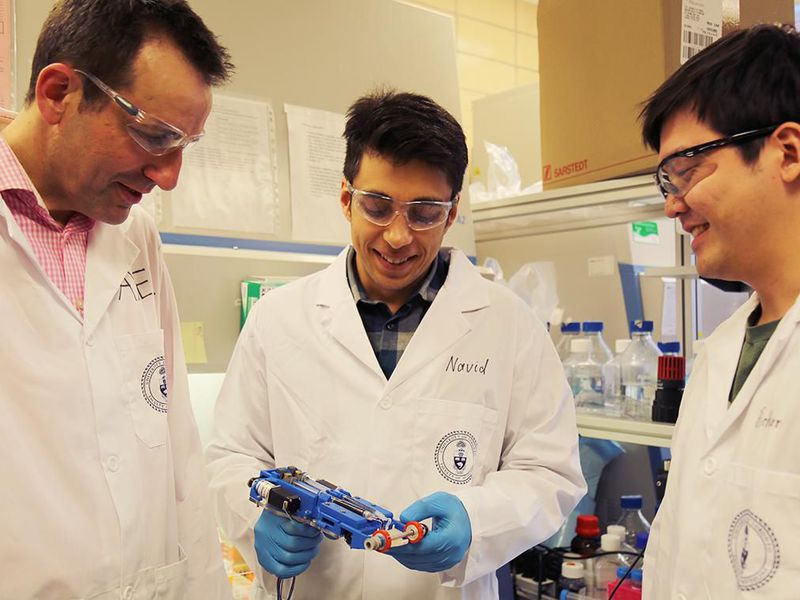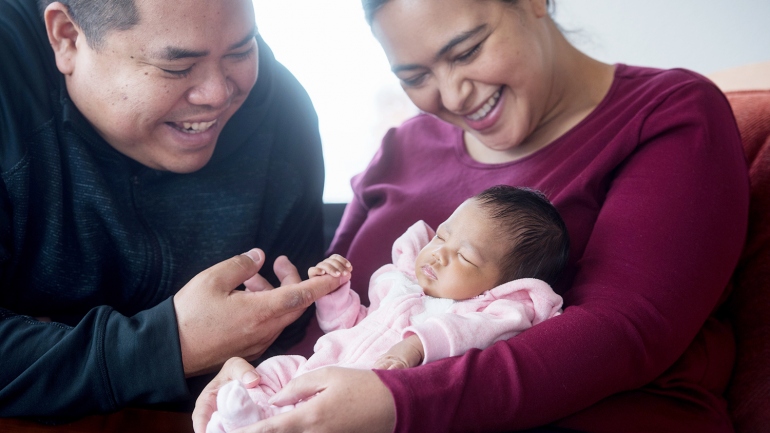
This Handheld Device Could Print New Skin Onto Burn Victims

Researchers have long been looking for methods of creating artificial skin grafts, either from biological or synthetic materials. There are a number of such products on the market, but they have limitations: some are expensive, some can only be used temporarily, some take weeks to create from the patient’s own skin cells. The University of Toronto researchers developed a printer the size of a shoe box, weighing less than one kilogram (2.2 pounds). It dispenses strips of “bio ink” made of biological materials. These materials include collagen—the most abundant protein in the dermis, or middle layer of the skin—and fibrin, a protein needed for wound healing. The strips of artificial skin can be deposited directly on the injured area.
These cells turn lung transplants deadly
Researchers have uncovered the precise cells that flow into and cause inflammation in newly transplanted lungs.
Understanding immune system interplay to improve organ transplant success
A rare opportunity to analyse both blood and tissue samples from human transplant recipients has allowed immunology researchers at the Babraham Institute to pinpoint how an immunosuppressive drug works to prevent the production of antibodies against the transplanted tissue. This understanding, gained through working together with transplant research immunologists in Oxford, may lead to improved ways of identifying transplant recipients at risk of rejection and treating autoimmune disease.
Baby Born in World's First In Utero Stem Cell Transplant Trial
May 25 - An in utero stem cell transplant for a critically ill second-trimester fetus has led to the birth of an apparently healthy infant. The newborn is the first patient enrolled in the world's first clinical trial using stem cells transplanted prior to birth.

A 'wake-up call' about what's killing America's young people
(CNN)There has been a significant rise in accidental deaths, homicides and suicides among young people across the United States, and experts are calling it a wake-up call. The total death rate for 10- to 19-year-olds in the United States declined 33% between 1999 and 2013 but then suddenly soared 12% between 2013 and 2016, according to a new report from the National Center for Health Statistics at the US Centers for Disease Control and Prevention.
Don't Miss our 10th Anniversary of the Declaration of Istanbul @ TTS2018

This workshop will comprise a half-day morning program addressing common ethical and clinical dilemmas in the management of organ donation and transplantation cases that may involve organ trafficking, and a half-day afternoon program exploring the update to the Declaration of Istanbul on Organ Trafficking and Transplant Tourism in the context of persisting and emerging issues in this field.
Jayme Locke, TTS Young Members Committee Co-CHair wins ACTS Distinguished Investigator Award

May 23 - The honor, received by Jayme Locke in April at the Association for Clinical and Translational Science Conference in Washington, D.C., is presented to a senior investigator whose innovative research or education leadership has had a major impact on or through clinical and translational science, specifically in applying translational research findings into effective public policies that promote health.
Researchers Want To Show HIV-Positive Organ Donation Is Safe And Can Save Lives
A large-scale clinical trial launched by the National Institutes of Health in May could pave the way for more HIV-positive patients with kidney disease to receive life-saving transplants.
The trial, called the HOPE in Action Multicenter Kidney Study, will assess the risks of transplanting kidneys from HIV-positive donors into patients living with the virus, says Dr. Christine Durand, assistant professor of medicine at Johns Hopkins University and a principal investigator of the study.
CLICK HERE TO READ THE FULL ARTICLE
Transplantation - Featured Article
Submitted by Dr Karen Keung, Editorial Fellow, Transplantation.
Terasaki Epitope Mismatch Burden Predicts the Development of De Novo DQ Donor-Specific Antibodies and are Associated With Adverse Allograft Outcomes
Willicombe M, Blow M, Santos-Nunez E, Freeman C, Brookes P, Taube D.
Transplantation. 102(1):127-134
In predicting the development of de novo donor specific antibodies (DSA), recent data suggests that matching at the epitope level is superior to matching at the antigen level. HLA DQB1 antibodies are the most common de novo donor-specific antibodies (DSA) detected postrenal transplantation. In this retrospective study of renal transplant recipients, the authors compared the immunogenicity of the different HLA antigens, individual DQB1 alleles, and DQB1 Terasaki-defined Epitopes (TerEp), to determine whether DQ epitopes determined by Terasaki could more accurately predict de novo DQ development over HLA antigen matching (n=1003, mean follow up 4.28 ± 2.18 years posttransplant); 198 (19.74%) kidney transplant recipients developed de novo DSA of which 88 (44.4%) developed a DSA against a DQB1 mismatched antigen. In patients mismatched at a single DQB1 allele, the risk of de novo DQ DSA development increased with the number of TerEp mismatches, although the immunogenicity of the different DQ TerEps did not appear to be equal. Antibody mediated rejection-free survival was inferior in all patients with an antibody against TerEp epitopes. These data show that epitope mismatch burden determined by TerEps helps predict risk of de novo DQ DSA development and offers an alternative approach to predict an alloimmune response, which can further aid immunologic risk assessment.
U.S. DRUG OVERDOSES MEAN MORE ORGANS FOR TRANSPLANTATION, HARVARD STUDY SHOWS
May 30 - The opioid epidemic ravaging the U.S. is killing tens of thousands a year, with over 63,600 overdose deaths in 2016. Although opioid prescriptions have started falling, the crisis is not abating. When pills aren't available, many users turn to heroin or its more dangerous cousin, fentanyl. But a strange phoenix has risen from these ashes: life-saving organs available for transplantation. After Mandeep Mehra and a colleague at Harvard Medical School noticed an increase in the number of donors, they tracked the source to opioid-related deaths. Newsweek spoke with Mehra, a professor of medicine, about the discovery of this disconcerting correlation.

In the News
Precision medicine taking the individual's whole genome into consideration
May 25 - Precision medicine has the potential to transform drug therapy and patients' lives. A recent study published in Human Genomics brings us closer to unlocking that potential.
CLICK TO READ THE FULL ARTICLE
Indy 500 drivers don't like to talk about organ donation, but it's becoming their cause
May 24 - At the Indianapolis Motor Speedway Stefan Wilson's race car trumpets from its sidepods, its prime patch of advertising space, in bold letters: "Driven 2 Save Lives." It's a slogan of the Indiana Donor Network, one of Wilson's chief sponsors. The aim is to encourage people to register as organ donors.
CLICK HERE TO READ THE ARTICLE
Pulmonary Hypertension Has Adverse Effect on Post-Lung Transplant Survival
May 25 - Pulmonary hypertension (PH) confirmed by preoperative cardiac catheterization is associated with the prognosis of Asian patients after lung transplantation for end-stage lung disease, according to the results of a study published in the Journal of Thoracic Disease.
Contact
Address
The Transplantation Society
International Headquarters
740 Notre-Dame Ouest
Suite 1245
Montréal, QC, H3C 3X6
Canada
Используйте Вавада казино для игры с бонусом — активируйте промокод и начните выигрывать уже сегодня!

